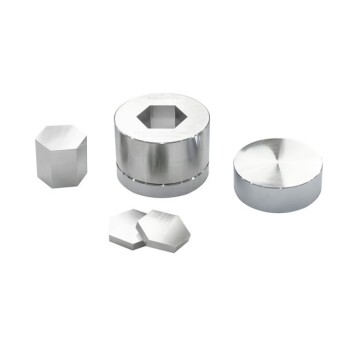At its core, a hydraulic press is the critical link that transforms a bulky, end-of-life vehicle into a manageable, valuable commodity. By applying immense, focused force, these machines compress cars into dense, uniform blocks, solving the fundamental logistical problem of moving low-density scrap metal efficiently.
The primary contribution of a hydraulic press to car recycling is not just crushing a car, but radically improving the economics of the entire process. It converts a high-volume, low-density problem into a low-volume, high-density solution, making transportation and processing vastly more efficient.

The Core Problem: Volume vs. Value
An end-of-life vehicle is mostly empty space. Its value lies in its raw materials, but its shape makes it incredibly inefficient to handle, store, and transport.
The Challenge of Empty Space
A whole car takes up a significant footprint in a scrapyard and on a transport truck. Moving a small number of uncompressed cars over long distances to a processing facility is often cost-prohibitive due to fuel and labor expenses.
How a Car Baler Works
A car baler is a specific type of hydraulic press designed for this task. The vehicle is placed inside a large chamber, where powerful hydraulic rams exert thousands of tons of force, first from the sides and then from the top, compacting the vehicle into a dense rectangular bale.
The Impact on Transportation Logistics
This compaction is a logistical game-changer. Instead of transporting two or three whole cars, a single flatbed truck can carry twenty or more compressed bales. This dramatically reduces the number of trips, fuel consumption, and associated costs required to get the scrap metal to a shredding facility.
Optimizing the Shredding Process
Feeding a dense, uniform bale into an industrial shredder is far more efficient and safer than feeding it an entire car. The uniform shape prevents jams, protects the machinery, and allows for a continuous, predictable flow of material, maximizing the shredder's operational uptime.
Understanding the Prerequisites and Limitations
Simply crushing a car is dangerous and environmentally irresponsible. The process requires careful preparation, and not all hydraulic presses in the industry are used for crushing.
The Critical Step of Depollution
Before a car can be crushed, it must undergo depollution. This is a mandatory process where all hazardous materials are drained and removed. This includes gasoline, oil, coolant, brake fluid, and refrigerants. The battery and potentially hazardous components like airbag canisters are also removed.
Safety and Environmental Compliance
Failure to properly depollute a vehicle before crushing can lead to soil and groundwater contamination at the scrapyard and dangerous reactions within the shredder. This preparatory step is essential for both environmental safety and regulatory compliance.
Not All Presses Are for Crushing
While balers focus on volume reduction, other types of hydraulic presses play a different role. For example, smaller pellet presses are used in metallurgical labs to test the properties of the recycled metals. By compressing samples of shredded material, engineers can test its strength, purity, and durability, ensuring it meets the quality standards for use in new products.
The Press's Role in Your Goal
The function of the hydraulic press is best understood through the lens of your specific interest in the recycling chain.
- If your primary focus is logistics and cost-efficiency: The hydraulic baler is the key technology that makes scrap metal transport economically viable.
- If your primary focus is processing and material recovery: The press acts as a preparatory tool, creating uniform feedstock that optimizes the speed and safety of industrial shredders.
- If your primary focus is quality control and innovation: Specialized hydraulic presses are used to test and validate the integrity of recycled materials, enabling their use in new manufacturing.
Ultimately, the hydraulic press is an engine of efficiency, enabling the modern car recycling industry to operate at scale.
Summary Table:
| Aspect | Contribution |
|---|---|
| Volume Reduction | Compresses cars into dense bales for easier handling |
| Transportation Efficiency | Reduces trips and costs by increasing load capacity |
| Shredding Optimization | Provides uniform bales to prevent jams and enhance safety |
| Quality Control | Enables material testing in labs for strength and purity |
Ready to enhance your car recycling operations with reliable hydraulic presses? KINTEK specializes in lab press machines, including automatic lab presses, isostatic presses, and heated lab presses, designed to meet the needs of laboratories focused on material testing and quality control. By partnering with us, you'll benefit from improved efficiency, reduced costs, and precise performance in your recycling processes. Contact us today to learn how our solutions can drive your success!
Visual Guide

Related Products
- Laboratory Hydraulic Press 2T Lab Pellet Press for KBR FTIR
- Laboratory Hydraulic Press Lab Pellet Press Button Battery Press
- Heated Hydraulic Press Machine with Heated Plates for Vacuum Box Laboratory Hot Press
- Heated Hydraulic Press Machine With Heated Plates For Vacuum Box Laboratory Hot Press
- Manual Heated Hydraulic Lab Press with Integrated Hot Plates Hydraulic Press Machine
People Also Ask
- How do hydraulic press machines ensure precision and consistency in pressure application? Achieve Reliable Force Control for Your Lab
- What are some laboratory applications of hydraulic presses? Boost Precision in Sample Prep and Testing
- How is a laboratory hydraulic press used for polymer melt crystallization? Achieve Flawless Sample Standardization
- Why must a laboratory hydraulic press be used for pelletizing samples for FTIR? Achieve Precision in Spectral Data
- How is a laboratory hydraulic press used for Tb(III)-Organic Framework FT-IR samples? Expert Pellet Pressing Guide



















